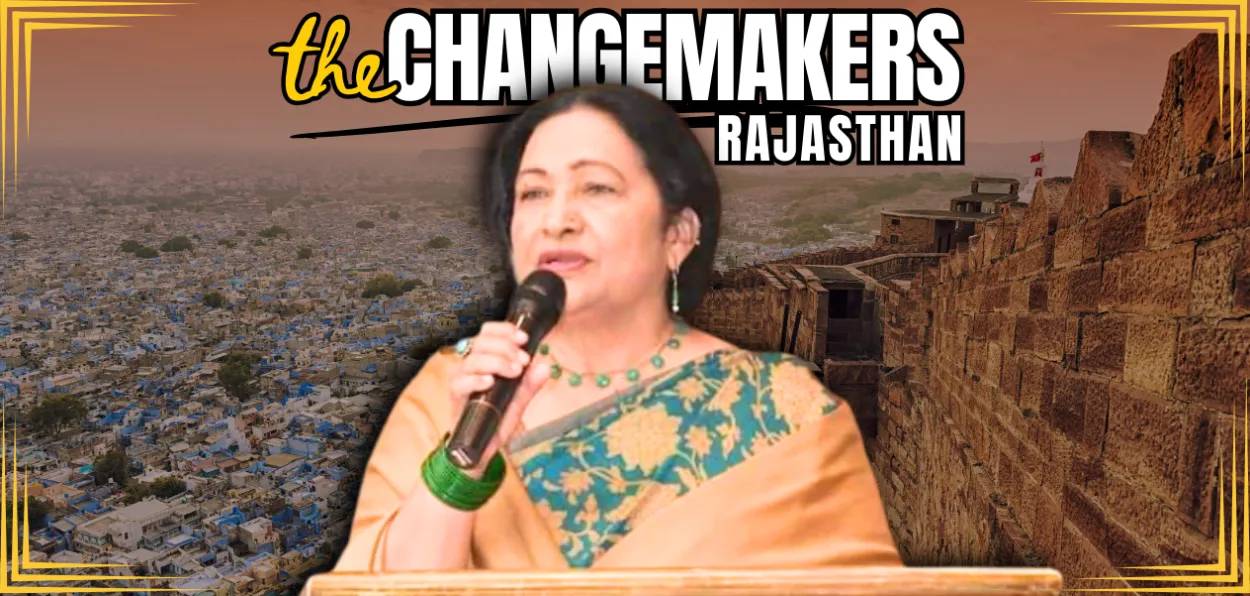
Mohammad Farhan Israeli/Jaipur
Nishat Hussain holds the distinction of being Rajasthan’s first female Muslim Qazi and a tireless advocate for the rights of Muslim women.
Her life journey is one of courage, perseverance, and an unwavering belief in the need for societal reform. Through her efforts, she has not only raised awareness among thousands of women about their rights but has also inspired them to take charge of their lives.
Her early years were a reflection of communal harmony. “We didn’t know who was Hindu or Muslim — we were all the same,” she recalls.
.jpeg)
Growing up in Karauli, a remote and underdeveloped area where girls’ education was largely neglected, Nishat made history. She became the first Muslim girl in the district to pass the 10th standard — and the only Muslim student among 1,200 girls.
Nishat was born in the Sitabari Mohalla of Karauli, where her family was the only Muslim household, living in proximity to three temples.
Her father was the master tailor to the Karauli royal family. At the age of 17, she married Mohammad Hussain of Jaipur, a gazetted officer and a progressive thinker who strongly supported women's rights. His vision gave Nishat the direction and encouragement she needed to find her own path.
In Jaipur, she opened “Nishat Academy,” a school that educated 350 underprivileged children, of whom only five percent were Muslim.
But a turning point came in 1989, during the communal riots in Jaipur. The violence deeply shook her, but it also ignited a resolve to fight against the social stereotypes and injustices that divided society.
Her school, threatened during the unrest, was protected by children and their parents who said, “This is a temple of education. We don’t know if it is Hindu or Muslim, but it is teaching our children.” That moment marked her spiritual rebirth — and the beginning of her life as a social reformer.
In the same year, she founded the National Muslim Women Welfare Society, which was officially registered in 1992. The inclusion of the word "Muslim" was deliberate — to assert that Muslim women are patriotic citizens who seek progress and inclusion.
The organization worked in sensitive areas such as Ajmer and Sarana to promote communal harmony, bringing different communities together for dialogue and cooperation.
She spoke out for those wrongfully arrested under the TADA law, and personally met then-Chief Minister Bhairon Singh Shekhawat to demand jail reforms.
.jpeg)
Shekhawat affectionately referred to her as “sister,” and she tied a rakhi on him in return. When offered the post of commission chairperson, she declined, saying, “I only want blessings, not a position.”
Following the riots, when many girls were forced to drop out of school, Nishat opened 20 adult education centers to help women complete their studies up to the 10th standard.
She also established Jaipur’s first counseling center, where women from all religious backgrounds could seek guidance. “At least one household is saved every day,” she says. She also conducted counseling workshops for men to sensitize them to women's rights and dignity.
.jpeg)
Challenging yet another societal norm, Nishat pursued the idea of women becoming Qazis. She completed a five-year course in Mumbai, studying Islamic jurisprudence and the Indian Constitution.
Alongside Jahanara and Afroz, Nishat became one of Rajasthan’s first female Qazis. Although met with significant resistance, her stand was validated by a renowned Islamic scholar who cited the existence of 250 female Qazis in Islamic history.
She also played a pivotal role in the nationwide campaign against triple talaq. As Rajasthan’s convener of the Bharatiya Muslim Mahila Andolan, she filed a writ petition in the Supreme Court. With testimonies and support from thousands of women, the movement gained strength, culminating in the Supreme Court’s landmark 2017 decision declaring triple talaq unconstitutional.
According to Nishat, this has led to a 95 percent reduction in divorce cases among Muslims.
.jpeg)
Over the last 32 years, her organization has secured justice for thousands of women — even handling three international cases. In recognition of her work, she has received numerous honors, including the National Unity Award and the Shanti Doot Samman. Yet, she humbly says, “My true happiness comes not from awards, but from the trust of the people.”
Nishat’s family life is equally inspiring. Her two sons and daughter run a women’s welfare organization in Dubai. Her grandson, Abdul Muqeet, was honored by Prime Minister Narendra Modi at the age of nine for his environmental work in Abu Dhabi.
Her views on the hijab reflect a balanced and modern outlook. “The Quran speaks about modesty, not about covering the face,” she says. “Dignity matters more than a dress code.” In her office, women wearing burqas work alongside others without any pressure or judgment.
.jpeg)
Nishat believes that the condition of Muslim women is gradually improving. More women are raising their voices, and families are placing greater emphasis on girls’ education. But she also expresses concern over the growing inclination among youth toward drugs, gambling, and other destructive habits. “If men cooperate,” she says, “society can truly improve.”
Her organization is also working to build unity among Muslim, Dalit, and tribal communities. In a recent “rice distribution” campaign, she distributed food to people across castes and religions, emphasizing the message: “Maintain brotherhood and protect the Constitution.”
ALSO READ: Businessman Abdul Latif facilitated 5,000 weddings, promotes education
From the same modest office in Jaipur’s Johri Bazaar where her journey began, Nishat Hussain continues to lead the charge for social change. Despite her age, her passion, energy, and unwavering commitment serve as an inspiration to today’s youth. Her life is a testament to the belief that genuine change stems not from power or position, but from the purity of intention.
